Guangdong ChongWei Technology Ltd. , https://www.chongweitech.com A few days ago, a Zhongtai pure electric taxi caught fire in Hangzhou, sparking public concerns about the safety of pure electric vehicles (BEV). The industry once again began a new round of discussions on the future of BEV.
A few days ago, a Zhongtai pure electric taxi caught fire in Hangzhou, sparking public concerns about the safety of pure electric vehicles (BEV). The industry once again began a new round of discussions on the future of BEV.
In fact, we can't negate the safety of all electric cars with the fire of a Zotye electric car. It's like we can't think that all cars are not safe enough because there are some car collisions that do not reach 3 stars. Security, of course, is a big problem for BEV. The cell phone battery will explode, let alone use an electric vehicle with a much harsher environment and working conditions! However, the European NCAP did a BEV crash test shortly before. As a result, all 4 BEVs achieved a 4 star rating (up to 5 stars), and volvo's internal experiments have also proved that the BEV can achieve the same level as an ordinary car. safety standard.
However, for BEV, I still insist on my attitude: There is basically no drama in 10 years. It is not because it is insecure, but it is difficult to achieve a breakthrough in the foreseeable future in which the battery energy density is too low, the cost is too high, and the charge is too slow.
At present, the general level of the industry, BEV once charging theoretical mileage is about 160 kilometers, in fact only about 100 kilometers, taking into account the round-trip, the current BEV activity radius of only 50 or 60 kilometers, in other words, that is, you open A BEV is basically not out of town. Under such circumstances, the promotion of BEV as a private car is unlikely, and this is not a question of government subsidies. At present, the support for electric vehicles in Shenzhen and Beijing has been very strong. In Shenzhen, they can get a subsidy of RMB 120,000 for electric vehicles. Moreover, China Southern Power Grid also promises to install two charging piles for consumers, one at home, and one unit at a time. One; Beijing promises not only to enjoy the same amount of subsidy as Shenzhen, but also does not need a shake number for electric cars. The intensity is so great, but electric cars still seem unattractive. According to relevant sources of China Southern Power Grid, Shenzhen has built more than 2,000 charging piles with extremely low utilization rates and are basically idle.
Compared with last year's industry-wide hot-selling of electric vehicles, this year's industry, media, and officials have become more rational and pragmatic when it comes to treating BEV. Miao Miao, minister of the Ministry of Industry and Information Technology, said recently that the promotion and popularization of electric vehicles requires major breakthroughs in battery technology. The premise is to disclose the thermal cooling of electric vehicles.
Contrary to what everyone thinks, I have never opposed electric vehicles. At least 6 years ago, I made it clear that the new energy revolution centered on electric drive is one of the three major trends in automobiles. This is because, first of all, electricity is the most widely sourced of all forms of energy. Wind power, hydropower, nuclear power, solar energy, fossil fuels, and biofuels can all be used to generate electricity. Second, the conversion of electricity into mechanical energy. The process can have high efficiency and minimal energy loss. With current internal combustion engines for vehicles, we all know that the thermal efficiency is very low, generally less than 30%.
However, this major trend must be based on a major breakthrough in battery technology. Prior to this, blindly promoting BEV may be rejected by the market. During the transition from electric vehicles to electric vehicles, hybrid power (including plug-in hybrid and extended-range electric vehicles) may not be surpassed.
However, our industrial policy now seems to have made it clear that the direction of new energy is BEV, and I am very worried that after we have gambled on a pure electric vehicle, we still have to revert to the development of hybrid power. This concern is well-founded. Ten years ago, the giants of the automotive industry vowed to tell us that 2011 will be the era of hydrogen economy, and fuel cell vehicles will be mass-produced. Now it is almost 2012. Fuel cell vehicles have not ushered in large-scale production, but there are fewer and fewer people mentioning them. On the contrary, the BEV that was sentenced to death was hot and hot.
It is certain that electric cars will still be hot spots at this year's Shanghai Auto Show. However, it is very regrettable that these various BEVs will only be as lively as possible in the pavilion and will not be able to become realistic on the road.